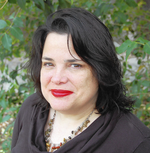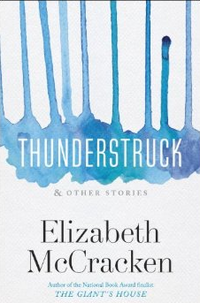National Book Award finalist Elizabeth McCracken's Thunderstruck & Other Stories is a national treasure. The stories in Thunderstruck brim over with both magic, and the despair that follows devastating loss. Perhaps this is not surprising, as Thunderstruck follows McCracken's 2008 memoir An Exact Replica of a Figment of My Imagination, which detailed the author's life before and after her first baby died during her ninth month of pregnancy.
The characters in Thunderstruck are wide-ranging, but they share the strange, exquisite logic of grief. And somehow, remarkably, the stories manage to be very funny too, filled -- not just with sadness -- but with phrases like, "It was so hot you could hear the mayonnaise go bad..."
In theNew York Times book review, Sylvia Brownrigg writes:
The fact that there is nothing depressing about the ubiquity of accident and disaster in Thunderstruck and Other Stories is a powerful testament to the scratchy humor and warm intelligence of McCracken's writing.
I spoke with Elizabeth McCracken about Thunderstruck & Other Stories.
Mary Pauline Lowry (MPL): In Thunderstruck & Other Stories, so many of the characters experience loss. It's as if each reflects a different facet of the cut crystal of grief: One mother mourns the ruined life of her son charged with murder; another mother grieves her daughter dead from lymphoma; a man sorrows for his young wife who has died of a stroke. Did you set out to write a collection of stories about loss and grief?
Elizabeth McCracken (EC): I didn't. In fact, I was sort of stunned when I read it and realized how griefstruck most of the characters were, and even now, reading reviews, I tell myself, Well, your next book should try to be a little cheerier. I suppose it was what life handed me, by which I mean: I'm growing older. I don't mean that my life is sadder than it used to be, but while I was writing the book I was very aware of how much sadness shapes any life -- it bends you if it doesn't break you. Sadness was something I was thinking about in my life outside of writing, so it wormed itself into whatever I wrote.
MPL: In recounting the moment when an abusive relationship ends the narrator of the story "Some Terpsichore" says, "Here is what I want to tell you: I knew something was ending, and I was grateful, and I missed it." This is one of the most insightful lines of fiction I've read about intimate partner violence. Could you tell me a little bit about this mixed idea of loss and escape?
EC: When I was writing that story, I was thinking a lot about love, and how (in life as well as fiction) people want to believe that romantic love is real only if it's 24 karat. A friend recently said, "I was reading letters from someone I used to love--I mean, I thought I did, but that wasn't love." People say that a lot, but only about love. Nobody says, I thought I was angry, but that wasn't anger. Or: I thought I was frightened of him, but it wasn't really fear. Or even: I thought I loved my mother, but that wasn't love. I wanted this character to know that she actually loved this violent and damaged man, and she wanted to hold onto that love even as she was glad to escape him. She's done wrestling with her love for him.
MPL: Conversely, in the story "Juliet," the narrator views violence against women by male intimate partners as both ubiquitous, and as a sort of safeguard from violence perpetrated on women by strangers. The narrator says, "A murder. We hoped for two things: That we did not know the victim and that the murderer did.... We wanted to read in the paper: Last week, she filed for a restraining order. Hadn't every murdered woman? None of the library staff had ever asked for a restraining order..." Could you talk a bit about this false idea so many of us have that we can keep ourselves safe from tragedy by being different from those whom tragedy strikes?
EC: Oh, I don't know if I can say any more than that, other than it's a strange and ugly and completely human process. It's the same reason people believe in God: they want to know that there's some intangible force that will keep them safe from the disasters that befall others. You believe in God or statistics or the way your narrative differs from other people.

Elizabeth McCracken
MPL: Thunderstruck is your first book of short stories in 20 years. (Though it's very worth noting that in that time you have published two novels and a memoir). In the acknowledgments of Thunderstruck you thank Michael Ray of Zoetrope: All Story for getting you writing short stories again by asking you "the right question at the right time." What question did he ask you?
EC: "Do you have a free story you'd like to submit?"
